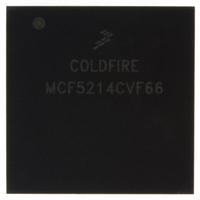MCF5214CVF66 Freescale Semiconductor, MCF5214CVF66 Datasheet - Page 148

MCF5214CVF66
Manufacturer Part Number
MCF5214CVF66
Description
IC MPU 32BIT COLDF 256-MAPBGA
Manufacturer
Freescale Semiconductor
Series
MCF521xr
Datasheet
1.MCF5216CVM66J.pdf
(766 pages)
Specifications of MCF5214CVF66
Core Processor
Coldfire V2
Core Size
32-Bit
Speed
66MHz
Connectivity
CAN, EBI/EMI, I²C, SPI, UART/USART
Peripherals
DMA, LVD, POR, PWM, WDT
Number Of I /o
142
Program Memory Size
256KB (256K x 8)
Program Memory Type
FLASH
Ram Size
64K x 8
Voltage - Supply (vcc/vdd)
2.7 V ~ 3.6 V
Data Converters
A/D 8x12b
Oscillator Type
Internal
Operating Temperature
-40°C ~ 85°C
Package / Case
256-MAPBGA
Package
256MA-BGA
Device Core
ColdFire
Family Name
MCF521x
Maximum Speed
66 MHz
Operating Supply Voltage
3.3 V
Data Bus Width
32 Bit
Number Of Programmable I/os
142
Interface Type
QSPI/UART/I2C/CAN
On-chip Adc
8-chx10-bit
Number Of Timers
8
Lead Free Status / RoHS Status
Contains lead / RoHS non-compliant
Eeprom Size
-
Available stocks
Company
Part Number
Manufacturer
Quantity
Price
Company:
Part Number:
MCF5214CVF66
Manufacturer:
Freescale Semiconductor
Quantity:
10 000
Company:
Part Number:
MCF5214CVF66J
Manufacturer:
Freescale Semiconductor
Quantity:
10 000
- Current page: 148 of 766
- Download datasheet (9Mb)
Power Management
Recommendations for, and features of, FlexCAN’s stop mode operation are as follows:
If stop with self-wake is activated, and the FlexCAN operates with single system clock per time-quanta,
then there are extreme cases in which FlexCAN's wake-up upon recessive to dominant edge may not
conform to the standard CAN protocol, in the sense that the FlexCAN synchronization is shifted one time
quanta from the required timing. This shift lasts until the next recessive to dominant edge, which
re-synchronizes the FlexCAN back to conform to the protocol. The same holds for auto-power save mode
upon wake-up by recessive to dominant edge.
The auto-power save mode in the FlexCAN is intended to enable NORMAL operation with optimized
power saving. Upon setting the AUTO POWER SAVE bit in the MCR register, the FlexCAN looks for a
set of conditions in which there is no need for clocks to run. If all these conditions are met, then the
FlexCAN stops its clocks, thus saving power. While its clocks are stopped, if any of the conditions below
is not met, the FlexCAN resumes its clocks. It then continues to monitor the conditions and stops/resumes
its clocks appropriately.
The following are conditions for the automatic shut-off of FlexCAN clocks:
7-12
•
•
•
•
•
•
•
•
•
•
•
•
•
Self-wake mechanism. If the SELF-WAKE bit in the MCR is set at the time the FlexCAN enters
stop mode, then upon detection of recessive to dominant transition on the CAN bus, the FlexCAN
resets the STOP bit in the MCR and resumes its clocks.
Upon stop/self-wake mode entry, the FlexCAN tries to receive the frame that caused it to wake;
that is, it assumes that the dominant bit detected is a start-of-frame bit. It does not arbitrate for the
CAN bus then.
Before asserting stop Mode, the CPU should disable all interrupts in the FlexCAN, otherwise it
may be interrupted while in stop mode upon a non-wake-up condition. If desired, the
WAKE-MASK bit should be set to enable the WAKE-INT.
If stop mode is asserted while the FlexCAN is BUSOFF (see error and status register), then the
FlexCAN enters stop mode and stops counting the synchronization sequence; it continues this
count once stop mode is exited.
The correct flow to enter stop mode with SELF-WAKE:
— assert SELF-WAKE at the same time as STOP.
— wait for STOP_ACK bit to be set.
The correct flow to negate STOP with SELF-WAKE:
— negate SELF-WAKE at the same time as STOP.
— wait for STOP_ACK negation.
SELF-WAKE should be set only when the MCR[STOP] bit is negated and the FlexCAN is ready;
that is, the NOT_RDY bit in the MCR is negated.
If STOP and SELF_WAKE are set and if a recessive to dominant edge immediately follows on the
CAN bus, the STOP_ACK bit in the MCR may never be set, and the STOP bit in the MCR is reset.
If the user does not want to have old frames sent when the FlexCAN is awakened (STOP with
Self-Wake), the user should disable all Tx sources, including remote-response, before stop mode
entry.
If halt mode is active at the time the STOP bit is set, then the FlexCAN assumes that halt mode
should be exited; hence it tries to synchronize to the CAN bus (11 consecutive recessive bits), and
only then does it search for the correct conditions to stop.
Trying to stop the FlexCAN immediately after reset is allowed only after basic initialization has
been performed.
No Rx/Tx frame in progress.
No moving of Rx/Tx frames between SMB and MB and no Tx frame is pending for transmission
in any MB.
MCF5282 and MCF5216 ColdFire Microcontroller User’s Manual, Rev. 3
Freescale Semiconductor
Related parts for MCF5214CVF66
Image
Part Number
Description
Manufacturer
Datasheet
Request
R
Part Number:
Description:
Manufacturer:
Freescale Semiconductor, Inc
Datasheet:
Part Number:
Description:
Manufacturer:
Freescale Semiconductor, Inc
Datasheet:
Part Number:
Description:
Manufacturer:
Freescale Semiconductor, Inc
Datasheet:
Part Number:
Description:
Manufacturer:
Freescale Semiconductor, Inc
Datasheet:
Part Number:
Description:
Manufacturer:
Freescale Semiconductor, Inc
Datasheet:
Part Number:
Description:
Manufacturer:
Freescale Semiconductor, Inc
Datasheet:
Part Number:
Description:
Manufacturer:
Freescale Semiconductor, Inc
Datasheet:
Part Number:
Description:
Manufacturer:
Freescale Semiconductor, Inc
Datasheet:
Part Number:
Description:
Manufacturer:
Freescale Semiconductor, Inc
Datasheet:
Part Number:
Description:
Manufacturer:
Freescale Semiconductor, Inc
Datasheet:
Part Number:
Description:
Manufacturer:
Freescale Semiconductor, Inc
Datasheet:
Part Number:
Description:
Manufacturer:
Freescale Semiconductor, Inc
Datasheet:
Part Number:
Description:
Manufacturer:
Freescale Semiconductor, Inc
Datasheet:
Part Number:
Description:
Manufacturer:
Freescale Semiconductor, Inc
Datasheet:
Part Number:
Description:
Manufacturer:
Freescale Semiconductor, Inc
Datasheet:











